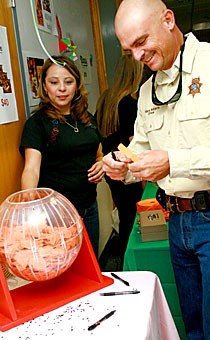University employees donated more than $375,000 of their own earnings to 31 UA programs and 151 nonprofit agencies last year, according to a UA Cares official.
Holly Altman, coordinator of UA Cares, said the money was raised through a variety of campuswide and departmental events, including the seventh annual UA Cares Breakfast and Raffle, which was hosted Friday by the UA Budget Office.
UA Cares is an organization that allows employees to donate to the community through United Way or to UA programs.
Every year, the Budget Office chooses a local group to help, said Ann Araiza, co-coordinator of the event.
During the last seven years, the office has raised more than $11,000 for causes from collecting and buying books for elementary schools to providing assistance to a local women’s domestic violence shelter, Araiza said.
The focus of this year’s event was to raise money through a raffle and breakfast fundraiser for Robison Elementary School, Araiza said.
Friday’s breakfast served 159 people and garnered about $1,500 for Robison Elementary, said Cindy McHenry, co-coordinator of the breakfast and a Budget Office administrative associate. Raffle prizes included gift cards and certificates to area businesses, including Funtasticks, La Salsa and the Reid Park Zoo.
Dick Roberts, Budget Office assistant vice president and budget director, said the play area for the school’s children in first through third grades needs shading equipment to keep children cool in the warmer months of the academic year while they play under the Arizona sun.
The university ultimately benefits when children of the schools it helps go home and tell their parents, “”The U of A is great,”” said Jim Florian, an assistant budget officer.
Both the kids and their parents develop an affinity for the university that may translate into future students, Florian added.
Some of the money raised by UA Cares goes directly to help students, with $17,242 contributed to student scholarships in 2005, Altman said.
Other areas of funding include the President’s Fund for Excellence, the UA Sarver Heart Center, UA medical research programs and various departments and advisory councils throughout the university, Altman said.
Additionally, the universitywide UA Cares initiative includes an opportunity for students in the UA School of Art.
Every year, art professor Jackson Boelts assigns the project of creating the poster for the initiative to one of his classes, Altman said. The UA Cares steering committee chooses the winner.
“”We think this year’s is especially beautiful,”” Altman said. The design includes an abundance of stylized hearts tumbling down from the top of the poster and pooling at the bottom, on a red background.
University employees and departments are diverse in where they choose to donate through payroll deductions, Altman said.
Heather Lo, an applications system analyst with the Center for Computing and Information Technology, said she donated to Wingspan in 2005 but is not sure which program she will choose this year.
Cathy Michaels, an assistant professor of nursing, said since she supported a campuswide program last year, she will donate to a community program this year.
“”It’s hard to make a decision (about which program to choose) when the money is tight,”” Michaels said.
Janice Crist, also an assistant professor of nursing, said she will donate to Southside programs, particularly in the Sunnyside neighborhood.
Student employees are also eligible to donate, Altman said.
McHenry said she will be donating to a cause that is close to her heart: diabetes research.
She chose the UA’s Steele Children’s Research Center in hopes the researchers will find a way to heal her 14-year-old son, who has diabetes.
“”When my son was diagnosed five years ago, they kept saying, ‘There are cures around the corner,'”” McHenry said. The cure is still elusive.
Unlike donations to nonprofit organizations through United Way, the Steele Center will receive all of her donation, McHenry said.
The donation will be distributed through the University of Arizona Foundation, which does not charge the 16 percent administrative fee imposed by United Way.
Only donations of more than $5,000 are charged a 6 percent administrative fee through the foundation, according to the foundation’s Web site.
Helping children in elementary schools is important to the university as a whole, McHenry said.
“”These are our future students,”” she said. “”We need to invest in that.””









